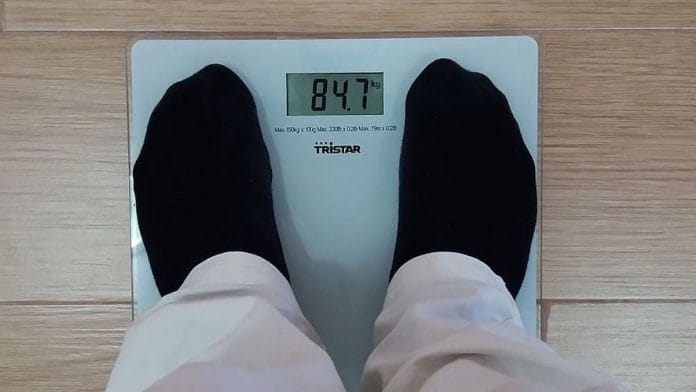If you are concerned about weight gain during lockdown, you are not alone.
For more than one-and-a-half years, the world has been dealing with the Covid-19 pandemic. Repetitive lockdowns have brought a brand new set of challenges that affect the daily life of millions. One of the most common complaints is weight gain. For people who were already struggling with obesity, gaining weight during the pandemic added more health risk. Sudden weight gain in healthy individuals has invited the risk of multiple other lifestyle disorders such as Type 2 diabetes, hypertension, and heart diseases. The sedentary lifestyle isn’t helping.
A cohort analysis among 100 participants during 49 days of lockdown in India showed a trend towards weight gain in 40 per cent people, with 16 per cent experiencing a 2.1-5.0 kg weight increase.
Chronic stress, sedentary lifestyle, high-carbohydrate diet, sugar, and ordering high-calorie foods online are some contributing factors to quarantine weight gain.
What is the quarantine diet
The quarantine diet has been all about panic buying and stockpiling comfort, convenient, cheap, fast and junk foods. Maggi, India’s favourite instant noodles, saw a 25 per cent rise in sales during the first lockdown. The manufacturer reported all five units in India had to ramp up noodles production to meet the demand. Popular biscuit brands like Parle G, Britannia’s Good Day, Tiger, Bourbon, Marie, Milk Bikis, Parle’s Monaco, Hide & Seek and Krackjack also reported exploding sales amid the lockdown. Instant noodles are highly processed, loaded with refined glucose with zero nutrition value and found to be linked with obesity and other lifestyle disorders. But the lack of time and work from home meant that urban Indians bought more packaged, processed foods when they were not ordering in.
A Statista report shows that between March and July 2020, “the most ordered dish on Swiggy was chicken biryani with over 550,000 orders”. It was followed by butter naan, masala dosa, chocolate lava cake, birthday cake and gulab jamun.
Also read: Diet pills, fat burners, herbal tea — Why they damage our health more than help us lose weight
Stress, mental health and other factors
Joblessness, financial problems, uncertainty spurred by the pandemic led to an increased stress level. Furthermore, quarantine also amplified mental health issues like depression, anxiety and loneliness. Research has proven that anxiety and depression are associated with chronic and long term weight gain. Additionally, loneliness has also been linked with higher risk of weight gain. People struggling with mental health issues lack the motivation to exercise.
Very little or no physical activity, work from home, closure of health clubs, sports facilities along with eating junk contributed to the extra pounds. A 2020 study of over 3,000 US adults found physical activity was reduced by 32.3 per cent among previously active participants due to the pandemic.
Also read: Drastic changes in diet, increase in anxiety, loneliness — how Covid altered lifestyles
Getting back on track
We don’t know when the Covid pandemic will end or if we will have more lockdowns. Quarantine is going to be the new normal for the time being and you must incorporate some good old healthy habits in this new lifestyle.
More home-cooked meals: The first change comes from the kitchen. Stop buying junk foods like instant noodles, biscuits, and snacks. Try planning a healthy meal. A 2017 observational study in 40,554 French participants found that meal planning was associated with a healthier diet and less obesity.
Say no to processed foods, eat more whole foods: Start eating fruits, vegetables, more protein, and whole grains to restore the lost dietary habit. Eat more home-cooked meals. A 2017 population-based cohort study in the UK suggests that eating five home-cooked meals per week made participants 28 per cent less likely to be overweight, and 24 per cent less likely to have excess body fat.
Shop smarter – “If you buy healthy, you will eat healthy”. Stock up healthy staples like pulses, whole grains, frozen or fresh colourful fruits and vegetables. Avoid mindless shopping by making a grocery list two weeks in advance.
Move more, do what you enjoy – Start with a walk around the neighbourhood, some stretches and yoga. In fact, a morning walk will help to get some Vitamin D. Try home workout apps, online personal training, online Zumba classes. A 2015 US study involving 726 participants found fitness app users were more likely to workout during their leisure time, compared to those who do not use exercise apps.
Make a fresh routine – Even though you are at home, a daily routine will help in restoring a sense of normality. Fix times for waking up, eating, exercise, office work, leisure and stick to that. A sleep routine is a must as lack of sleep is associated with obesity.
Also read: Type 2 diabetes? Sitting can cause problems with blood sugar levels
Bottom line
Go easy with yourself during these trying times. Weight gain is frustrating, depressing and stressful, but too much self-criticism can lead to negative thoughts that will affect your mental health and make the whole process tougher than usual. Take it slow; one step at a time. Be kind to yourself, after all, we are going through a pandemic.
Dr Subhasree Ray is Doctoral Scholar (Ketogenic Diet), certified diabetes educator, and a clinical and public health nutritionist. She tweets @DrSubhasree. Views are personal.
(Edited by Neera Majumdar)






